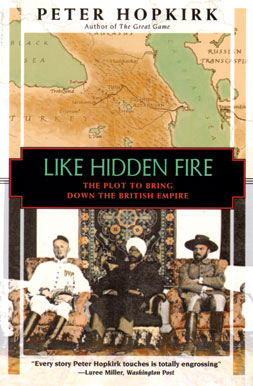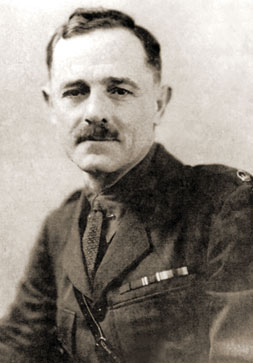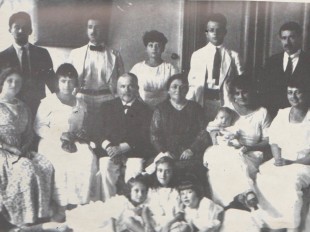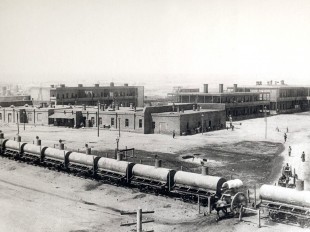 Page 38-40
Page 38-40 by Peter Hopkirk
Azerbaijan first achieved independence as a unified state on 28 May 1918, but it was a status born out of desperate struggle. In fact, Ganja was the first capital of the Azerbaijan Democratic Republic because Baku was still under the control of Bolsheviks, led by Stepan Shaumian and supported by the Armenians; British interests were in the hands of Ranald MacDonell. The struggle for control of Baku was a merciless one and the Azerbaijanis paid a heavy price for their desire to control their own destiny. Peter Hopkirk, the British historian, recounts in his book, ‘Like Hidden Fire – the plot to bring down the British Empire’, just how heavy that price was. Even Shaumian was driven to admit that the events of early April 1918 were, “to some extent, the character of a national massacre”. Here is Hopkirk’s description of those events, from which it seems almost impossible to believe that Azerbaijanis could recover to assert their independence, even within Baku, within a matter of months.
Shortly after Noel’s departure, Baku had erupted into bloodshed. The Jungalis, it appeared, now held him personally responsible for the massacre of several thousand of their fellow Muslims at the hands of Armenians. To understand how this came about, it is necessary to look briefly at the events leading to this bloody turmoil. Shortly after hearing of Noel’s capture, MacDonell, then still in Baku received a message asking him to call urgently on one of the leading Muslim figures in Shaumian’s left-wing coalition. Although calling itself the Baku Soviet, it included Muslims and others who were neither Bolsheviks nor necessarily sympathetic to their aims. After discussing, somewhat circumspectly, the general political situation with his Muslim host over tea and biscuits, MacDonell rose to go, wondering why he had been invited in the first place. He was soon to find out. Reaching into his desk, the Azerbaijani drew out a bundle of papers. From these he extracted an envelope. Mac- Donell at once recognized it as one he had given to Noel to post to his wife immediately he reached the safety of the British lines. Apologising for opening it, MacDonell’s host handed it to him, saying that it had been found to contain nothing compromising. The letter, he said, had been discovered by the Jungalis, together with other papers, among Captain Noel’s possessions. The other papers, however, were highly compromising. ‘They clearly show’, he told MacDonell, ‘that you and he were involved in the escape of General Polovtsov from the Bolsheviks.’ With a suspicion of a smirk, he added: ‘This would be a serious matter for you if it reached the ears of Shaumian and his commissars.’
MacDonell hardly needed to be told this. He asked the Azerbaijani whether he proposed to inform Shaumian. ‘No,‘ he was told. ‘Not unless you attempt to carry out any of Noel’s schemes.’ This put him on the spot, for he had already been instructed to do just that, now that Noel was out of action. His task was, in his own words, to ‘devise or create a situation’ that would enable General Dunsterville to enter Baku and organise its defence against the advancing Turks. In effect, this meant arranging the overthrow of those members of the Baku Soviet, including Shaumian, who opposed British military intervention, not to mention those Muslims eager to welcome the Turks as their liberators from Russian rule. ‘At the time,’ MacDonell observed, ‘the task looked pretty hopeless.’ However, he assured the Azerbaijani that if the British government had any such intentions it would hardly entrust them to ‘one as unskilled as myself’ when it had at its disposal a highly efficient secret service. And so they left it, with MacDonell uncomfortably aware that his di plomatic cover had been partly, if not entirely, blown. Flight was out of the question. Not only would he be closely watched, but even if he reached Enzeli he would almost certainly meet with the same fate as Noel. Anyway, his orders were to remain in Baku while there was still hope of keeping it out of the hands of the Turks.
As it happened, MacDonell need not have worried. Baku was now suddenly gripped by events which drove all other thoughts from men’s minds, regardless of their political or ethnic affinities. The question of Polovtsov’s escape became past history, while the threat of British intervention was momentarily forgotten. Survival became the princi pal concern of the various factions. The crisis came as no surprise, however. Although Shaumian had managed to forge a coalition between his own Bolsheviks, the Armenians and the city’s Muslims, it had from the start been an exceedingly fragile one, rent by fears, suspicions and jealousies. Whilst willing, for reasons of expediency, to form temporary alliances, the princi pal factions had widely conflicting aims. There was no love lost between any of them, least of all between the Azerbaijanis and the Armenians. Baku, not for first time in its history, was a powder keg, merely waiting for the match to be applied to it. The explosion came in April 1918.
Alarmed by the growing military strength of the Armenians, to which British funding had undoubtedly contributed, the Baku Muslims had secretly sought help from their co-religionists elsewhere. Among those who responded were units of the all-Muslim Savage Division, which had until the Revolution formed part of the Tsarist forces. Flushed by their success in overthrowing the Bolshevik garrison at the Caspian port of Lenkoran, some detachments now set sail for Baku. Their arrival, on March 30, caused great consternation among both Bolsheviks and Armenians. When officials were sent down to the dockside to try to discover what their intentions were, they were driven back by gunfire, a number of them being killed. Eventually, however, the newcomers were disarmed by a stronger Bolshevik force. But then more units of the Savage Division arrived and on April 1, in MacDonell’s words, ‘the Baku cauldron boiled over’.
No one really knows who fired the first shot, but very soon the city had become a battlefield, with trenches and barricades being hastily prepared everywhere. Russian gunboats in the harbour, whose crews were mostly sympathetic to the Bolsheviks and their leftist allies, joined in against the Muslims, mercilessly bombarding their quarter of the city, and wreaking terrible carnage and destruction. But it was the Armenians who decided the issue. At first they proclaimed their strict neutrality, and refrained from taking part in the struggle for the control of Baku. They withdrew their forces to the Armenian quarter and deployed them purely for self-defence. But their neutrality only lasted for the first few hours of the battle. Under intense pressure from the Dashnaks, an extremist Armenian nationalist group, their leaders joined forces with the Bolsheviks against the Muslims. It was a decision they would pay for dearly before six months were out. ‘For three days it was touch and go as to who would get the upper hand,’ wrote MacDonell. ‘But at last the Tartars and the Savage Division were beaten back, and by the fifth day not a single Muslim of any importance was left in the town, and few of their houses were left standing.’ Some 10,000 armed Muslims, together with a handful of former Tsarist officers, had been soundly beaten by 6,000 Bolshevik and 4,000 Armenian troops.
One British witness to the slaughter was Ida Dewar Durie, the wife of a British officer serving with the military mission in Tiflis. As it looked more and more as though the Germans would shortly take over Tiflis, she had left for the seeming safety of Baku, together with other Allied wives and civilians. She was staying in the Hotel d’Europe, anxiously awaiting word of her husband Robert, when she found herself caught up in the battle for Baku, which she watched from her bedroom window. In a letter to her family she described what she, and another Englishwoman sharing her room, saw as the battle ebbed and flowed in the streets around the hotel and shells from the gunboats shook the town.
‘Curiosity and excitement kept us recklessly glued to the window most of the day.’ Through the cracks in the shutters of their darkened room they saw the gleam of rifle barrels in windows and other vantage points up and down the street, while from a rooftop above them a Maxim machine-gun fired ceaselessly all day. The hotel itself, she went on, ‘wore a ghastly, deserted, squalid appearance, its dark, shuttered hall and staircase remaining packed with nervous people who bolted back up the stairs at the least alarm.’ The hotel stood in a part of the town held by the Bolsheviks, and ‘perspiring, red-faced, breathless’ soldiers rushed in and out, periodically barking ‘desperate orders hoarsely down the telephone’.
Across the road from Mrs Dewar Durie’s room was a hospital run by the Swedish Red Cross, already full of wounded German and Austrian POWs from the Eastern Front. Now the staff found themselves having to deal with local casualties too. ‘Every few minutes a dead or wounded man was dragged in by his feet and head. For the first time I looked down upon ashen faces smeared with blood, the hair black and ragged, and standing on end.’ Their colouring reminded her of the faces of the dead ‘in the huge battle pictures I had seen at Versailles long ago’. One wounded man was very nearly dropped as firing suddenly broke out, startling those lifting him out of the car which had brought him. All the wounded delivered to the hospital appear to have been Bolsheviks or Armenians, for Mrs Dewar Durie makes no mention of seeing any Tartar casualties, except for the dead, who were strewn about the streets in scores. Indeed, periodically search parties would comb the hotel ‘hunting for Tartars who had eluded them’, and once she witnessed two Muslims being dragged roughly along by a party of Bolsheviks. ‘As I looked, and without a second’s warning, the group halted, and the prisoners were shot in the head.’ Their executioners then wrenched off their boots and tossed their corpses into the gutter, where they remained for two days.
Occasionally the staff of the hospital opposite came out and washed away the blood from the entrance. But eventually, as more and more cases arrived, they gave this up. Some of the stretcher-bearers, she noticed, were German and Austrian POWs, ‘who worked splendidly’. Despite the fighting, an unending stream of men, women and children passed by below carrying huge bundles of possessions and bedding. Aged and aristocratic-looking ladies were being helped along by friendly soldiers, while one young girl, shrieking hysterically, was brought into the hotel to recover. After resting awhile, she was hustled on again by her wealthy-looking but distracted parents, her harassed, grey-haired mother ‘imploring her to bear up’. Other groups consisted of Tartar prisoners, their armed escorts holding aloft white flags on their bayonets. By this time there was a desperate shortage of food everywhere, and Mrs Dewar Durie and her companion were reduced to a diet consisting almost entirely of bread, cheese and Caspian caviar, for the hotel restaurant had long ceased to function. The shops in the street below had been looted, and Mrs Dewar Durie saw one hungry soldier, supposedly guarding the hotel, ‘flit across the street and do a little looting on his own account’. She was somewhat embarrassed when shortly afterwards he generously offered her some of the biscuits he had stolen.
By now the Muslim leaders could see that they had no hope of overthrowing the Bolsheviks and their allies and seizing control of Baku. They had unwisely taken the Armenian declaration of neutrality at face value, and had also been badly taken aback by the savagery of the naval bombardment. Rather than face total massacre, they therefore sued for peace. Urged by Lenin to show restraint towards the ethnic groups whom the Bolsheviks sought to win over to their cause, Shaumian agreed to a ceasefire. But the Armenians, seeing that at last they had their ancient foes on the run, were now out for vengeance. The fighting thus continued, until virtually the entire Muslim population had either been driven from the city or been slaughtered. By the fifth day, although much of the city was still ablaze, all resistance had ceased, leaving the streets strewn with dead and wounded, nearly all of them Muslims.
From her window, Mrs Dewar Durie watched grimly as the corpses were collected from where they lay and flung unceremoniously on to carts. ‘Some of the bodies’, she wrote, ‘were practically naked after the looting. Officers could be seen roughly searching their pockets, snatching out notebooks and papers soaked in blood, their own hands and arms red to the elbows.’ Although the shooting was over, the worries of those in the hotel were not. In the Muslim quarter, its flames fanned by a gale which had suddenly sprung up, a huge fire was raging out of control. Mrs Dewar Durie was told that it had been deliberately started by the Bolsheviks and Armenians in order to drive the Muslims out of their positions. Were the wind to change direction, and blow from the north, they were warned, then the hotel would be in the path of the flames. Desperately tired after several nights without sleep, they now packed up their belongings, ready to flee to the sea-front. ‘Until midnight,’ she wrote, ‘we watched the semicircle of flames now so close to us. Then, gradually, the wind began to die down, and we knew that another peril had passed us by.’ However, a further two months were to go by before she was reunited with her husband at Vladikavkaz, 100 miles north of Tiflis, where the British military mission was now based. Even then her troubles were not over for the mission were taken prisoner by the Bolsheviks, and she was forced to flee in disguise.
With the collapse of the Muslim revolt, the Baku Soviet had been saved. Shaumian reported at once to Lenin: ‘For us the results of the battle were brilliant. The destruction of the enemy was complete. We dictated to them the conditions, which were signed without reservation.’ While Azerbaijani sources claimed that as many as 12,000 Muslims, including old men, women and children, had been killed, Shaumian insisted that no more than 3,000 had died. But he admitted that the participation of the Armenian units ‘lent the civil war, to some extent, the character of a national massacre’, adding that ‘the Muslim poor suffered severely’. However, he went on to reassure Lenin that those Muslims who had not fled Baku ‘are now rallying around the Bolsheviks’. With the revolt crushed, and the Armenians, who had themselves suffered many casualties, thus weakened, Shaumian set about tightening his grip, politically and militarily, on the city. Arguing that together they would be better able to resist the Turks, whose war aims clearly went beyond their gains under the terms of the Brest-Litovsk treaty, he persuaded the Armenians to merge the best of their units with his. Even so his power barely extended beyond the city limits. For most of the surrounding region, including the crucial rail link, was still firmly in the hands of the pro-Turkish Azerbaijanis, resulting in desperate food shortages for the city’s inhabitants. As one historian subsequently put it: ‘Baku was a Bolshevik island in the midst of an anti- Bolshevik sea.’



